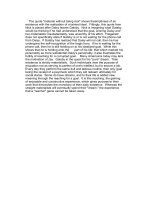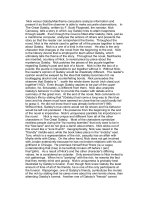realism in the great gatsby
Bạn đang xem bản rút gọn của tài liệu. Xem và tải ngay bản đầy đủ của tài liệu tại đây (27.27 KB, 2 trang )
F. Scott Fitzgerald's The Great Gatsby has been labelled a masterpiece,
and perhaps even one of the greatest novels of all time. In order to be
revered as a classic, a novel must have one or more qualities that place it
above the rest. One of The Great Gatsby's best qualities is Fitzgerald's
incredible use of realism. This realism is evident in the development of
plot, setting, and characters throughout the novel.The Great Gatsby is
well known for its deeply entangled plots and sub-plots. At first Fitzgerald
used realism to develop these plots by choosing plots that would be
beleivable to readers. For example, the main plot of "The American
Dream" (Jay Gatsby's dream of becoming rich and succesfull in order to
impress Daisy) is easily believable and is still a quite common dream
today. Smaller plots, such as Tom Buchanans affair with Myrtle, are also
very realistic and are a common occurrence in every day life. From here
Fitzerald deepened the story by using realism to entangle these plots.
Fitzgerald then grew apon these plots by making them all have realistic
outcomes (such as Gatsby's demise), rather than your typical story book
endings. It is mostly thanks to Fitzgerald's descriptive, poetic style of
writing that allows him to realistically portray the many plots of The Great
Gatsby. Fitzgerald's realistic construction and development of plot is
extremely dependant apon the setting of the novel in which it take
place.F. Scott Fitzgerald uses realism to clearly depict the setting of the
Great Gatsby. This incredible use of realism could be mostly due to the
fact that Fitzgerald lived during the time of the novel, and by using great
detail, he was able to reproduce his interpretation of the 1920's. At this
time the Great War (WW1) had just ended and the United States was
becoming as dominant world power. The novel takes place during the
summer in New York as Nick Carraway has just moved to persue a
career in the bond business. This is a very realistic setting because just
after World War 1 the eastern United States were flourishing with people
and business. As depicted in The Great Gatsby, during the 1920's jazz
music was all the rage. Large, fancy homes and big parties (such as
Gatsby's) were also quite popular. Fitzgerald realistically demonstrates
the inexistence of the middle class at that time. For example the contrast
between Tom Buchanan and Mr. Wilson shows vast difference between
the upper and lower classes. The exact geographical location of the novel
does not exist, but Fitzgerald does a great job in using realism to
convince the reader of the setting. No matter how significant realism is to
the setting of The Great Gatsby, perhaps the most important use of
realism comes through Fitzgerald's development of characters throughout
the novel. In the Great Gatsby, as in any novel, the characters are the
basis of the novel from which the plots revolve around. Fitzgerald uses
realism to ensure that all the characters in the novel are belivable in both
their history and interactions with each other. An prime example of this
would be Daisy. Her history of having a succesful family, and being the
center of attention deeply influences her character into being
self-centered and dependant on wealth, making her character belivable to
readers. From here Fitzgerald was able to manipulate the charactersThis
convinces the the reader of genuinity of each individual and therefore
makes the whole story seem more realistic.Throughout the novel plot was
deepened through the entangling of many realistic sub-plots, setting was
clearly illustrated using plenty of detail, and the characters were
develloped to be as beleivable and genuine as possible. In the end it is
the realistic recognition of life's imperfections that give The Great Gatsby
its continuing appeal.









